Bamboo Wood Cost Estimator
Bamboo wood flooring has become an increasingly popular choice for homeowners and commercial spaces due to its sustainability, durability, and unique aesthetic appeal. Known for its eco-friendliness, bamboo flooring offers a cost-effective alternative to traditional hardwoods while still providing the strength and beauty that many desire in their flooring. Accurate cost estimation is essential to ensure that your bamboo wood flooring project stays within budget and meets all design and functional requirements. Estimate Florida Consulting provides expert cost estimator services to help you plan and execute your bamboo wood flooring project with precision and efficiency.
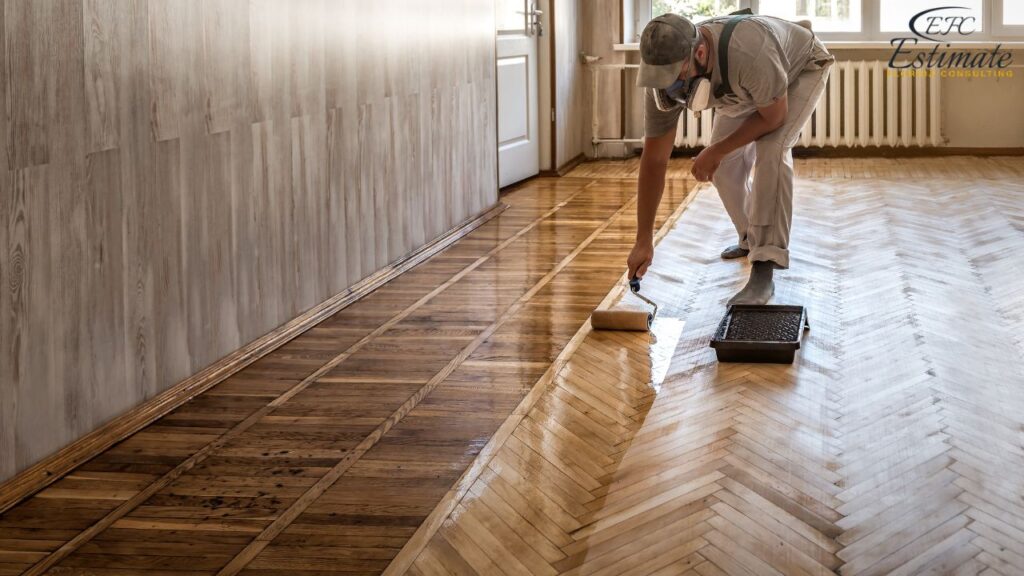
How Much Does Bamboo Wood Flooring Cost?
The cost of bamboo wood flooring can vary depending on several factors, including the type of bamboo, the size of the area to be covered, the complexity of the installation, and the specific design preferences. On average, bamboo wood flooring costs range from $7 to $15 per square foot, including materials and labor. Understanding these costs is essential for effective budgeting and planning, ensuring that your project stays within financial constraints while achieving the desired results.
Bamboo Wood Flooring Installation Costs by Project Scope
Here’s a breakdown of estimated bamboo wood flooring installation costs by area size, providing you with a clear understanding of how different project sizes impact overall costs:
Area Size (Square Feet) | Estimated Bamboo Wood Flooring Installation Cost per Square Foot | Total Cost Range |
500 square feet | $7 – $15 | $3,500 – $7,500 |
1,000 square feet | $8 – $16 | $8,000 – $16,000 |
5,000 square feet | $10 – $17 | $50,000 – $85,000 |
10,000 square feet | $12 – $18 | $120,000 – $180,000 |
Factors Influencing Bamboo Wood Flooring Costs
The cost of bamboo wood flooring can vary depending on several factors, including the type of bamboo, the quality of the material, the size of the area to be covered, and the installation method. Each of these factors plays a crucial role in determining the final cost, and understanding them will help you plan your project more effectively. By knowing what influences the price, you can make informed decisions that align with your budget and aesthetic goals.
Get Acquainted with Bamboo Wood Flooring
Types of Bamboo Flooring: Exploring Different Material Options
Bamboo flooring comes in several types, each offering different characteristics and price points. The type of bamboo flooring you choose will significantly impact the overall cost of your project. Knowing the differences between these types can help you select the best option for your space, balancing cost with durability and appearance.
Type of Bamboo Flooring | Average Cost per Sq.Ft. (Material Only) |
Horizontal Bamboo | $3.50 – $7.00 |
Vertical Bamboo | $4.00 – $8.00 |
Strand-Woven Bamboo | $5.00 – $10.00 |
Carbonized Bamboo | $4.50 – $9.00 |
Engineered Bamboo | $4.00 – $8.50 |
Horizontal Bamboo:
Horizontal bamboo flooring is created by layering bamboo strips horizontally, which highlights the natural grain of the bamboo and creates a more traditional wood appearance. Horizontal bamboo flooring typically costs between $3.50 and $7.00 per square foot. This type of bamboo flooring is often chosen for its natural and organic look, which adds warmth and character to any space. The way the grain is exposed in horizontal bamboo gives it a broader, more natural appearance, making it a great choice for rooms where you want to emphasize a connection to nature.
Vertical Bamboo:
Vertical bamboo flooring is made by stacking bamboo strips vertically, resulting in a more uniform and contemporary appearance with a linear grain pattern. Vertical bamboo flooring costs between $4.00 and $8.00 per square foot. This type of flooring is ideal for those who prefer a more modern and minimalist aesthetic, as the vertical orientation provides a clean and sleek look. The uniformity of vertical bamboo creates a streamlined and sophisticated look that pairs well with contemporary and minimalist interiors, making it an excellent choice for modern homes or commercial spaces.
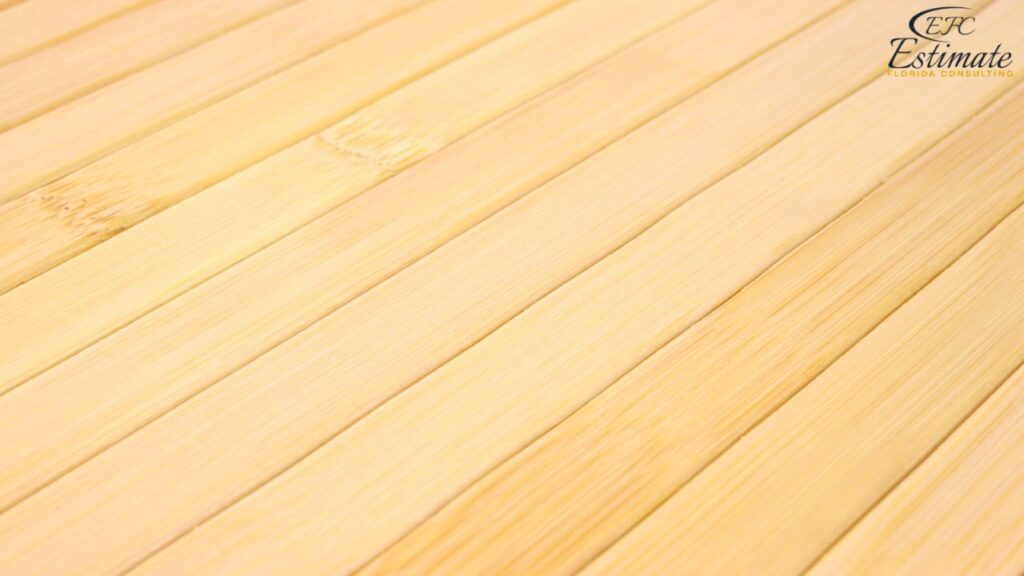
Strand-Woven Bamboo:
Strand-woven bamboo is the most durable type of bamboo flooring, made by compressing bamboo fibers under intense heat and pressure. This process creates a dense and hard material that is highly resistant to scratches, dents, and moisture. Strand-woven bamboo flooring costs between $5.00 and $10.00 per square foot. Its superior durability makes it an excellent choice for high-traffic areas and commercial spaces where longevity and resilience are key considerations. The density of strand-woven bamboo not only makes it incredibly durable but also provides a unique, textured appearance that adds depth and interest to any room.
Carbonized Bamboo:
Carbonized bamboo flooring is treated with heat to darken the color of the bamboo, giving it a rich, amber tone. This process also slightly softens the bamboo, making it less hard than natural bamboo. Carbonized bamboo flooring costs between $4.50 and $9.00 per square foot. The deep, warm tones of carbonized bamboo add a touch of elegance and sophistication to any room, making it a popular choice for living areas and bedrooms. The carbonization process also gives the bamboo a more consistent color throughout, which can create a more uniform and luxurious appearance in your space.
Engineered Bamboo:
Engineered bamboo flooring consists of a thin layer of bamboo on top of a plywood or fiberboard base, offering the look of bamboo with added stability. Engineered bamboo flooring costs between $4.00 and $8.50 per square foot. This type of flooring is particularly well-suited for areas with fluctuating humidity levels, such as basements and bathrooms, as it is less likely to expand or contract compared to solid bamboo. The engineered construction provides extra stability and moisture resistance, making it a practical choice for areas where traditional bamboo might struggle.
Additional Costs to Consider in Bamboo Flooring Projects
When planning your bamboo flooring project, it’s important to consider additional costs that may arise beyond the basic cost of the flooring material. These additional expenses can include installation, underlayment, subfloor preparation, and ongoing maintenance, all of which contribute to the overall cost of the flooring and ensure a successful installation. Understanding these additional costs will help you avoid surprises and ensure that your project stays within budget while delivering the desired results.
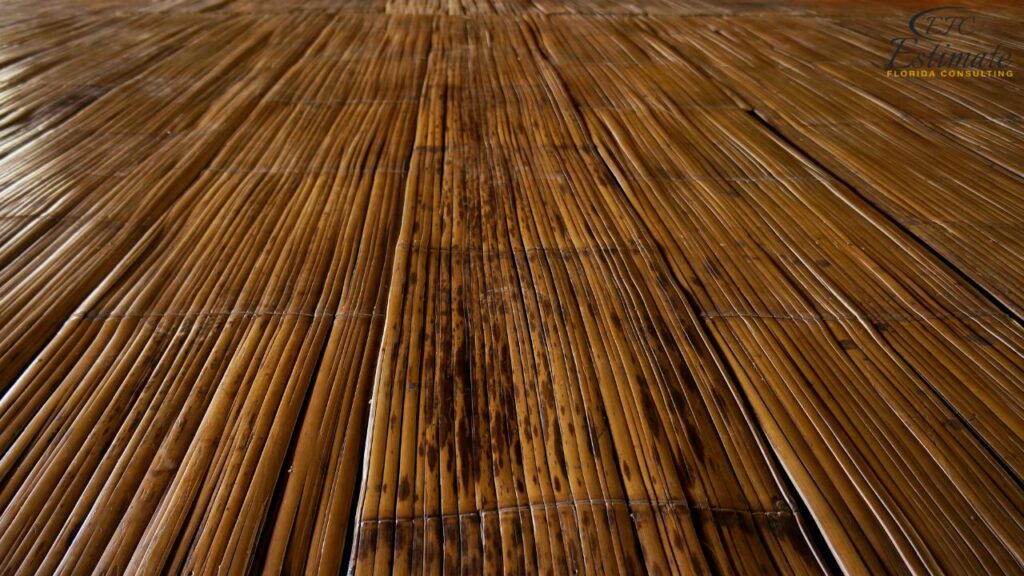
Installation Costs:
The cost of installing bamboo flooring can vary depending on whether you choose to hire a professional or undertake the installation yourself. Professional installation typically costs between $3.00 and $8.00 per square foot, depending on the complexity of the project and the region. While DIY installation can save money, it requires careful planning and precise execution to ensure a flawless finish. Professional installation, on the other hand, guarantees that the flooring is installed correctly and efficiently, reducing the risk of mistakes that could lead to additional costs down the line. Additionally, professional installers have the experience and tools necessary to handle any challenges that may arise during the installation process, ensuring a smooth and successful outcome. Opting for professional installation can also save you time and provide peace of mind, knowing that your floors are installed to the highest standards.
Underlayment and Subfloor Preparation:
Proper underlayment and subfloor preparation are essential for the performance and longevity of bamboo flooring. The cost of underlayment ranges from $0.30 to $1.00 per square foot, depending on the material chosen. Subfloor preparation, which may include leveling or repairing the existing subfloor, can add an additional $1.00 to $3.00 per square foot to your project. Ensuring that the subfloor is smooth, clean, and level is critical for preventing issues such as uneven surfaces, squeaking, or moisture problems. Proper underlayment also provides cushioning, noise reduction, and moisture protection, enhancing the overall comfort and durability of your bamboo flooring. Investing in high-quality underlayment can also improve the feel of your flooring underfoot and reduce sound transmission, making your home quieter and more comfortable.
Maintenance and Care:
Bamboo flooring is relatively low-maintenance, but it does require regular care to keep it looking its best. The cost of cleaning supplies and protective finishes can add to the overall cost of maintaining your floors. It’s important to use cleaning products specifically designed for bamboo or hardwood floors to avoid damaging the surface. Periodic refinishing may also be necessary to restore the floor’s shine and protect it from wear and tear, especially in high-traffic areas. By investing in proper maintenance, you can extend the lifespan of your bamboo flooring and ensure that it remains a beautiful and functional part of your home or business for many years. Regular maintenance not only preserves the appearance of your floors but also enhances their longevity, ensuring that your investment continues to pay off over time.
Estimating the Total Cost: A Detailed Example for a 1,000 Sq.Ft. Bamboo Flooring Project
To provide a clearer understanding of what to expect, here’s an example of estimating the cost for installing strand-woven bamboo flooring in a 1,000-square-foot area. This estimate includes the cost of the flooring, underlayment, installation, and basic maintenance supplies. Having a clear budget in mind will help you make informed choices about materials and installation methods, ensuring that you get the best value for your investment.
- Strand-Woven Bamboo Flooring: $5.00 – $10.00 per sq.ft.
- Underlayment: $0.30 – $1.00 per sq.ft.
- Professional Installation: $3.00 – $8.00 per sq.ft.
- Maintenance Supplies: $0.50 – $1.50 per sq.ft. (annual cost)
Cost Component | Low Estimate | High Estimate |
Strand-Woven Bamboo Flooring | $5,000 | $10,000 |
Underlayment | $300 | $1,000 |
Professional Installation | $3,000 | $8,000 |
Maintenance Supplies (Annual) | $500 | $1,500 |
Total Estimated Cost | $8,800 | $20,500 |
This example demonstrates how various components contribute to the overall cost of your bamboo flooring installation. By understanding these costs, you can better plan your budget and ensure that all aspects of the project are covered, leading to a successful and satisfying installation. Knowing the breakdown of costs helps you allocate your budget more effectively, allowing you to prioritize the most important aspects of your project.
Long-Term Maintenance and Care for Bamboo Wood Flooring
Investing in bamboo wood flooring is a long-term commitment that requires proper maintenance to preserve its beauty, durability, and functionality. Regular care is essential for ensuring that your bamboo flooring remains in top condition and continues to provide a stylish and eco-friendly surface for years to come. By staying proactive with maintenance, you can prevent minor issues from becoming major problems, ensuring that your floors look great and perform well for the long haul.
Routine Maintenance:
To extend the life of your bamboo flooring, regular maintenance is key. This includes sweeping or vacuuming the floor regularly to remove dirt and debris, as well as mopping with a damp (not wet) mop using a cleaner specifically designed for bamboo or hardwood floors. Avoid using harsh chemicals, abrasive cleaners, or excessive water, as these can damage the bamboo’s finish. Placing mats at entryways and using protective pads under furniture can also help prevent scratches and wear. By following a consistent maintenance routine, you can keep your bamboo floors looking beautiful and protect them from the daily wear and tear that can dull their appearance over time. Regular upkeep not only preserves the look of your floors but also enhances their resilience, helping them stand up to everyday challenges.
Periodic Refinishing:
Over time, even the most durable bamboo flooring may show signs of wear, such as scratches, dullness, or minor surface damage. Refinishing your bamboo floors periodically can restore their original shine and extend their lifespan. The refinishing process typically involves lightly sanding the surface to remove imperfections, followed by the application of a new finish to protect the bamboo and enhance its appearance. Refinishing not only improves the look of your floors but also reinforces their durability, ensuring that they continue to provide a high-performance surface for many years to come.
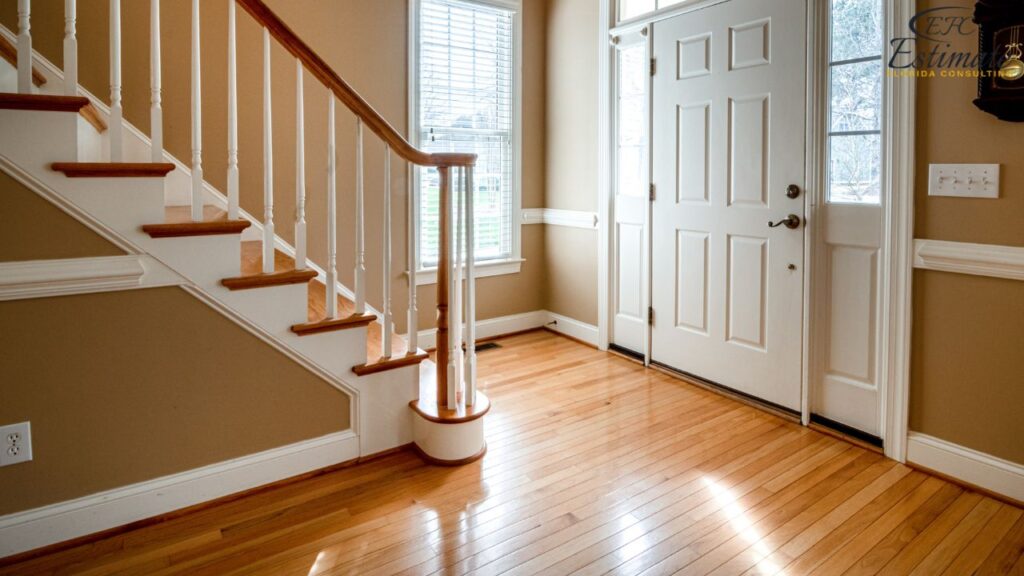
The ability to refinish bamboo flooring is one of its key advantages, allowing you to maintain the beauty, functionality, and longevity of your investment. By investing in refinishing when needed, you can keep your floors looking as good as new, while also enhancing their ability to withstand daily wear and tear.
Why Choose Bamboo Wood Flooring?
Bamboo wood flooring offers a unique blend of sustainability, strength, and beauty, making it an excellent choice for a variety of settings. Whether you’re considering bamboo for a residential space or a commercial project, its versatile nature ensures it can meet a wide range of needs. Here’s why bamboo might be the ideal flooring option for your home or commercial space:
Environmentally Friendly Flooring:
Bamboo is one of the most sustainable flooring options available today. Unlike traditional hardwood trees, which can take decades to mature, bamboo grows rapidly and can be harvested in just a few years. This rapid growth rate means that bamboo can be replenished much more quickly, making it a renewable resource that helps reduce deforestation and the overall environmental impact of flooring production. Additionally, bamboo requires minimal water and pesticides to grow, further enhancing its eco-friendly credentials. Choosing bamboo flooring is not just a stylish choice; it’s a responsible one that contributes to the preservation of our natural resources. Beyond its environmental benefits, bamboo also plays a significant role in carbon sequestration, helping to reduce greenhouse gases, making it a truly green choice for your flooring needs.
Long-Lasting Durability:
Despite being a type of grass, bamboo is incredibly strong and durable, often outperforming many traditional hardwoods in terms of resilience. High-quality bamboo flooring is known for its hardness, which makes it resistant to dents, scratches, and daily wear and tear. This durability makes bamboo an excellent choice for high-traffic areas in both residential and commercial settings. Additionally, bamboo’s natural resistance to moisture and insects adds to its longevity, ensuring that your floors will maintain their beauty and functionality for many years. Bamboo’s durability is complemented by its flexibility, which allows it to withstand heavy use without cracking or warping. Over time, bamboo’s durability can save you money on flooring repairs and flooring replacements, making it a cost-effective choice for long-term use.
Unique Aesthetic Appeal:
Bamboo flooring offers a unique and modern aesthetic that can enhance the look of any space. With its distinctive grain patterns and rich color variations, bamboo provides a warm and inviting atmosphere that complements a wide range of interior design styles, from contemporary to traditional. Bamboo is available in a variety of finishes, including natural, carbonized, and stained options, allowing you to choose the look that best suits your personal taste and décor. The natural variations in bamboo’s color and texture create a dynamic visual effect that adds character and depth to your floors.
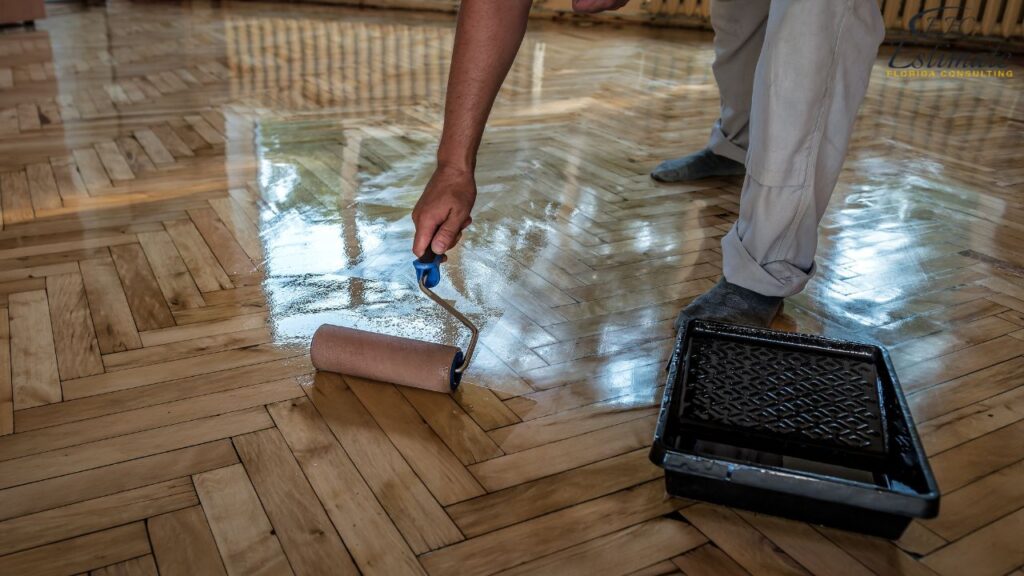
Additionally, bamboo’s sleek and smooth surface provides a clean and sophisticated look that enhances the overall aesthetic of your space. The versatility of bamboo allows it to blend seamlessly with various design elements, whether you’re aiming for a minimalist modern look or a cozy, rustic feel.
Bamboo Wood Flooring Cost Estimation
Accurate cost estimation is essential for the success of any bamboo wood flooring installation project. It helps prevent unexpected expenses that could disrupt your budget and timeline, ensuring that your project stays on track from start to finish. Misestimating the amount of material required or underestimating the complexity of the installation process can lead to significant cost overruns and delays, which can negatively impact the overall success of the project. A precise estimate allows you to manage your resources more effectively, ensuring that the right materials and labor are available when needed. Estimate Florida Consulting provides accurate estimate services that deliver the precision needed to keep your project on budget and on schedule, ensuring that it meets the highest standards of quality and performance.
Bamboo Wood Flooring Cost Calculator
To assist you in planning and budgeting your bamboo wood flooring project more accurately, Estimate Florida Consulting provides estimate services that include a comprehensive cost calculator. This tool allows you to input specific details about your project, such as the type of bamboo, the total area to be covered, and the complexity of the installation. The calculator then provides an estimated cost range tailored to your project’s specific needs, offering you a clear understanding of what to expect financially. This cost calculator is an invaluable resource that helps ensure your project plans align with your budget, allowing you to allocate the necessary financial resources effectively.
Download Template For Bamboo Wood Project Breakdown
- Materials list updated to the zip code
- Fast delivery
- Data base of general contractors and sub-contractors
- Local estimators

Conclusion
Bamboo wood flooring is a sustainable, durable, and visually appealing choice that offers numerous benefits for both residential and commercial spaces. By understanding the various costs involved, the factors that influence pricing, and the long-term maintenance requirements, you can make informed decisions that will enhance your space and add value to your property. Whether you choose horizontal, vertical, strand-woven, or another type of bamboo flooring, this versatile option provides a stylish and eco-friendly foundation that will bring warmth, character, and sustainability to your space for years to come. The unique qualities of bamboo flooring make it a truly special addition to any home or business, providing a beautiful and lasting surface that supports both your design goals and your commitment to the environment. With careful planning and attention to detail, your bamboo flooring project can become a successful and rewarding investment, adding beauty and value to your space for many years.
FAQs
Bamboo wood flooring is a sustainable and durable flooring option made from bamboo, a rapidly renewable resource. It offers a unique aesthetic appeal and is available in various types, including horizontal, vertical, strand-woven, carbonized, and engineered bamboo. Bamboo flooring is known for its strength, eco-friendliness, and ability to add a modern, natural look to any space.
The cost of bamboo wood flooring typically ranges from $7 to $15 per square foot, including materials and labor. The total cost depends on factors such as the type of bamboo, the area size, and the complexity of the installation. This range provides a general idea of what to expect when budgeting for your bamboo flooring project.
Several factors influence the cost of bamboo wood flooring:
- Type of Bamboo: Different types of bamboo flooring, such as strand-woven or carbonized, come at varying price points.
- Installation Method: Professional installation costs more but ensures a flawless finish.
- Subfloor Preparation: The condition of the existing subfloor and the need for underlayment can impact the overall cost.
- Maintenance Needs: Ongoing care and maintenance costs should also be factored into your budget.
Here’s a breakdown of the common types of bamboo flooring and their average costs:
- Horizontal Bamboo: $3.50 – $7.00 per sq.ft.
- Vertical Bamboo: $4.00 – $8.00 per sq.ft.
- Strand-Woven Bamboo: $5.00 – $10.00 per sq.ft.
- Carbonized Bamboo: $4.50 – $9.00 per sq.ft.
- Engineered Bamboo: $4.00 – $8.50 per sq.ft.
Strand-woven bamboo is the most durable type of bamboo flooring, made by compressing bamboo fibers under intense heat and pressure. It’s highly resistant to scratches, dents, and moisture, making it ideal for high-traffic areas and commercial spaces. Its durability and unique texture make it a popular choice for those seeking a long-lasting and visually appealing flooring solution.
Beyond the cost of the bamboo itself, consider the following additional costs:
- Installation Costs: $3.00 – $8.00 per sq.ft. for professional installation.
- Underlayment: $0.30 – $1.00 per sq.ft. for cushioning, noise reduction, and moisture protection.
- Subfloor Preparation: $1.00 – $3.00 per sq.ft. if leveling or repairs are needed.
- Maintenance Supplies: $0.50 – $1.50 per sq.ft. annually for cleaning and protective finishes.
Professional installation is recommended for bamboo flooring, especially for those unfamiliar with flooring projects. Professional installers have the experience and tools to ensure a flawless finish, reducing the risk of mistakes that could lead to additional costs. While DIY installation can save money, it requires careful planning and execution.
Estimate Florida Consulting offers a comprehensive cost estimator service, including a cost calculator. This tool allows you to input specific details about your project, such as the type of bamboo, area size, and installation complexity, to provide an estimated cost range. This helps you plan and budget your project effectively.
Bamboo wood flooring offers several benefits, including:
- Sustainability: Bamboo is a rapidly renewable resource, making it an eco-friendly choice.
- Durability: Bamboo flooring is strong and resistant to wear and tear, suitable for high-traffic areas.
- Aesthetic Appeal: Bamboo provides a unique and modern look with various grain patterns and color options.
- Versatility: Bamboo flooring works well in both residential and commercial spaces, offering flexibility in design.
Proper maintenance is essential for extending the life of your bamboo flooring. Regular sweeping, mopping with a damp mop, and using appropriate cleaning products will keep your floors looking their best. Avoid harsh chemicals and excessive water, and consider refinishing the floors periodically to restore their shine and protect them from wear and tear.
Yes, bamboo wood floors can be refinished to restore their original beauty and extend their lifespan. Refinishing typically involves sanding the surface to remove imperfections and applying a new finish. This process helps maintain the durability and aesthetic appeal of your floors over time.
Bamboo wood flooring is an excellent choice for those looking for a sustainable, durable, and visually appealing flooring option. Its eco-friendliness, combined with its strength and unique aesthetic, makes it a popular choice for both residential and commercial spaces. Bamboo flooring offers long-term value, providing a beautiful and lasting surface that aligns with modern design and environmental responsibility.
Google Reviews



Process To Get Bamboo Wood Cost Estimate Report
Here I am going to share some steps to get bamboo wood cost estimate report.
-
You need to send your plan to us.
You can send us your plan on info@estimatorflorida.com
-
You receive a quote for your project.
Before starting your project, we send you a quote for your service. That quote will have detailed information about your project. Here you will get information about the size, difficulty, complexity and bid date when determining pricing.
-
Get Estimate Report
Our team will takeoff and estimate your project. When we deliver you’ll receive a PDF and an Excel file of your estimate. We can also offer construction lead generation services for the jobs you’d like to pursue further.

